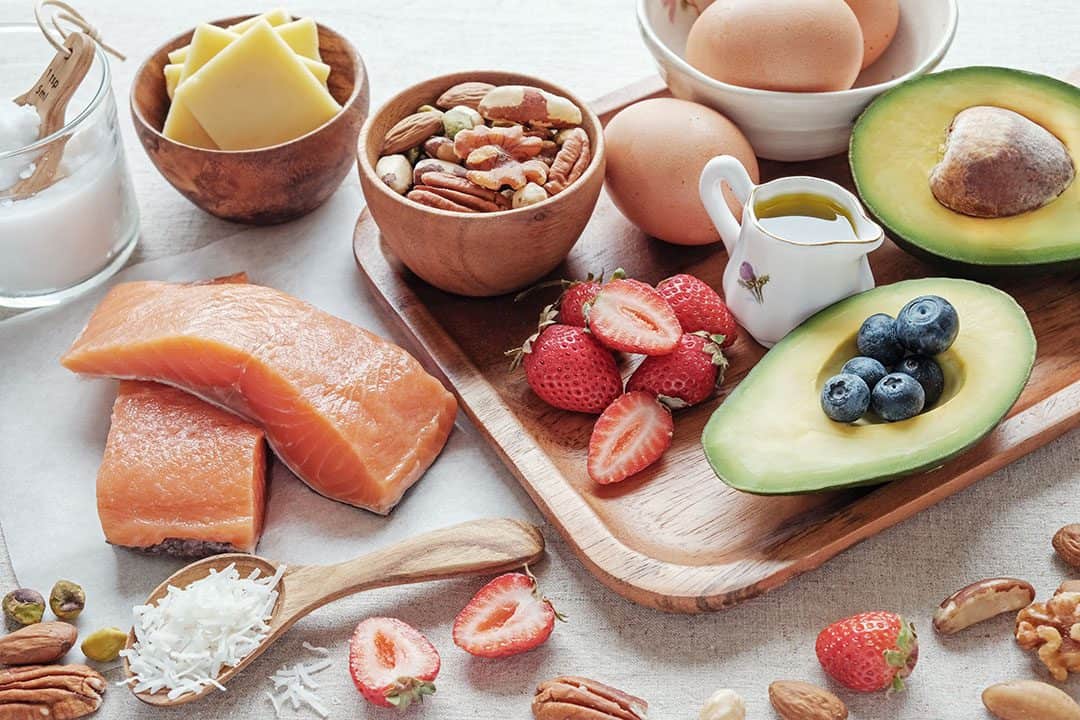This is a common query about keto-friendly fruit options. Can we eat all of it in our low-carb diet, or do we need to check it with our nutritionist? Well, here’s a blog post for you to clear your thoughts.
Is it good for you?
Fruits in their natural state are packed with nutrients and low in added sugar, like most other plant-based foods.
This makes them a great source of vitamins, minerals, and fiber. Vitamin C, potassium, and fiber, minimal calorie, salt, and fat content make them ideal for weight reduction.
Its consumption has several health advantages, including improved digestion, cardiovascular health, weight control, and a decreased chance of developing type 2 diabetes.
If you’ve got a sweet craving or are trying to cut down on added sugars in your diet, they are an excellent natural sugar substitute.
A tiny piece of it may supply a lot more nourishment than other types of sweets, even if it isn’t very filling.
What fruits are keto-friendly?
When you follow a low-carb diet, you put your body into a metabolic condition known as ketosis. This diet encourages the breakdown and use of fat.
As long as you stick to your macro targets, your meal plan has no dietary restrictions. Consuming high-carbohydrate meals may make it more challenging to meet your weight-loss objectives.
They have many health advantages, and they also taste great when eaten on a diet.
Explanation of Sugar Content
They are indeed packed with nutrients, but they also contain sugar. Few foods naturally have many carbohydrates.
Sugar content is one of its most common detractors. Despite our decrying of refined and added sugars, sugar itself is different from sugars found in such products.
Fiber is abundant in many plant-based diets, including vegetables. Blood sugar levels may be less affected by this carbohydrate form than others.
The body has a hard time digesting and absorbing fiber. There are advantages to this. Fiber may also aid in the removal of harmful substances like cholesterol.
Better digestion and cardiovascular health are linked to a diet rich in fiber. As a result, some have a lower glycemic index than other foods.
You may also consume fiber-rich foods while adhering to a diet. Fiber is typically subtracted from the carbohydrate level when calculating net carbohydrate content.
Keto-friendly fruit list
Most individuals need to consume fewer than 50 grams of net carbohydrates per day to go into a metabolic state.
Consider the fact that certain foods contain more than 25 grams of total carbs per serving, making it challenging to consume half of your daily carbohydrate consumption.
Tropical, dried juices and the particular whole of these foods all have a lot of sugar. A few popular choices, along with their net carbohydrate content per serving, are as follows:
1/4 cup: 36 grams of dates.
A 34g per Cup: Cranberry Juice.
1/4 cup: 31 grams of raisins.
A serving of dried figs has 28 grams.
24 grams of carbs per banana.
A cup of mango has 23 grams of sugar.
Pears have 22 grams each.
Grapes – 19 g per half-cup.
Each apple has 17 grams.
Best keto-friendly fruit
You may eat a more significant piece with fewer carbohydrates if they have high water or fiber content. Citrus cones, berries, and even melon are among the selection.
However, small amounts of these may still reflect your daily macro objectives and give nutritious value.
The best ones for low-carb dieters are those with net carbohydrate counts below 15 grams per standard serving.
Star Fruit
People unfamiliar with it typically have a hard time grasping what it is all about. It’s the oddly-shaped food found among papaya, mango, and guava in the produce aisle.
Low-carb newbies should broaden their perspectives.
Just 2 1/2 grams of net carbohydrates may be found in a half-cup. Sweet and juicy, with a tinge of tanginess, they’re a great snack. Antioxidants from Vitamin C and minerals like potassium and magnesium make it a good choice.
This is not the same as the kiwi in taste or appearance. Carbohydrate content is almost twice as high.
Berries
Low carb dieters should eat berries because of their low-calorie content. A few stand out above the others.
Small quantities of blackberries, raspberries, and strawberries won’t leave you feeling deprived.
The net carbohydrate content of a half-cup of raspberries is three grams. Blackberries have a little more, at five grams than strawberries. They’re all great for your health and well-being.
One of the healthiest berries is blueberry.
Manganese, vitamins C and K, and other vital nutrients abound in these foods. Antioxidant levels are among the highest of any food, including vegetables. Cardiovascular health has been improved by its capacity to reduce cholesterol levels.
In comparison to strawberries, blueberries have roughly seven grams of net carbohydrates per cup. You should only consume blueberries when your carb consumption is modest and as a treat.
What about a variety of berries other than blueberries? All but a few of these can be crossed off your to-do list.
Despite their low carbohydrate content, no one we know of consumes them in this way. When dried, their carbohydrate content rises to 62g. Goji berries are packed with even more nutrients.
They are an exception, though. Acai berries. Pureed Acai Berries have just two grams of carbohydrates in a half-cup serving, making them an excellent low-carb component.
Melons
Watermelon and Cantaloupe are great summer snacks since they’re sweet, refreshing, and low in calories. Lycopene, which is found in several low-calorie foods, is a potent antioxidant.
It’s best to go slowly if you’re on a low-carb diet. Dieters on a high-fat diet can eat one melon a day, but only in moderation.
Watermelon contains 5 1/2 grams of net carbohydrates per half cup, whereas Cantaloupe has 6 grams of net carbs per half cup. A half-cup of honeydew melon has seven net carbohydrates, so avoid it.
These are promising figures. You can get roughly 12 grams of net carbs from a small dish of Watermelon and Cantaloupe, which is about a cup’s worth of mixed melons. You shouldn’t consume this many carbs every day, even on a low-carb diet! Be aware.
Plums
It’s hard not to eat a juicy piece when it’s ripe. Sadly, most individuals will eat a lot of carbohydrates in addition to the sugary fruits and juices they are consuming.
The net carbohydrate content of a medium plum is 7 1/2 grams. Vitamins and minerals, including potassium and phosphorus, are also included in the juice.
Consuming a plum for breakfast, lunch, and supper won’t cause you to go out of metabolism. Consider if the plum will be worthwhile before you spend money on it.
Peaches, on the other hand, are pretty different. There are 13 net carbohydrates in medium-sized peaches, exceeding the daily allotment for severe low-carb dieters.
Avocado
Avocados contain healthy fats, fiber, and electrolytes; avocados are ideal for those following a low-carb diet.
Adding Avocado to cream may make it creamy and smooth, or it can be used as a serving dish for savory toppings.
Tomatoes
Many savory meals benefit significantly from using tomatoes as a low-carb ingredient.
Cooking with them is a terrific way to get started on your low-carb diet. There are a variety of ways to prepare and enjoy it.
Vitamin C, potassium, vitamin K, and the antioxidant lycopene are all abundant. Heart disease and cancer risk are both reduced when you do this.
Rhubarb
If you’re looking for this red-stemmed food outside of spring and summer, you’ll be hard-pressed to find it. However, it may be preserved by freezing and canning.
A cup of this tangy crop has more than 2 grams of fiber and 26 calories. Vitamins C and A, as well as extra protein and potassium, are also included.
Raw or roasted, you may indulge in its acidic flavor. Oxalic acids may cause toxicity in excessive amounts. Hence you should always remove the leaves before eating them.
Cantaloupe
A cantaloupe is hydrating like other melons. One cup has 54 calories. Low in fiber (less than 2 grams per cup) and high in sugar (13 grams per serving).
Cantaloupe is a popular summer treat. As a result, it’s ideal for those following a low-carb eating plan.
There are several health benefits of eating Cantaloupe, including potassium and beta carotene, found in it. In addition to snacking on it, you may also include it in your next salad.
Watermelon
This sweet and juicy one is a terrific low-carb choice because of its light flavor. It has 46 calories per cup (per USDA data).
It’s not like other melons, which are common in fiber. There are just 12 grams of carbohydrates per cup because of the high water content.
Agricultural Research Service scientists have discovered more than 1,500 valuable phytochemicals in Watermelon, including antioxidants and lycopene. Amazing, right?
Lemon
Dieters may enjoy the tangy juice and tart citrus tropic.
You may squeeze some lemon juice or a slice of Lemon into your ice water. 3g of carbs and 11 calories are included in one lemon juice. You will still get enough Vitamin C to keep your immune system healthy.
In addition to protecting against free radicals (compounds linked to aging or chronic disease), curcumin aids digestion.
Foods to Avoid on Low-Carb Diet
A low-carb diet should not contain any of these foods.
Oatmeal.
Grain of Wheat.
Flour made from whole wheat>
Rice.
Quinoa.
Rye.
Barley.
Corn.
Grapes.
Bananas.
Dates.
Mangoes.
Peaches.
Pineapples.
Raisins.
Roasted Potatoes.
Corn.
Peas.
Carrot.
Yam.
Lentils.
Henpecked beans.
Peas.
Soda.
Margarita.
Nutritional Water.
Lemonade.
Frappuccinos.
Low-fat dairy products.
Due to the large number of ingredients included in artificial sweeteners, they might be harmful.
Sugar cravings may be induced by sweeteners including Acesulfame, Sucralose, Saccharin, Acesulfame, and Sucralose.
Other health conditions, such as migraine discomfort, excessive cholesterol, blood sugar levels, and more, are connected.
Maintaining a strict diet is all about following the guidelines. If you stay away from these items, you’ll quickly realize the advantages of a diet with keto-friendly fruit.


















